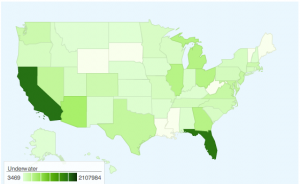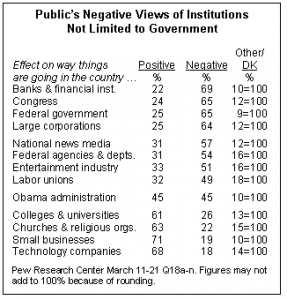How Would States Divvy Up the Foreclosure Settlement?
 For the record, I still doubt the 50-State-Less-the-Rule-of-Law-AGs Settlement will happen. A year in, they haven’t even agreed on the underlying guidelines for the settlement, like what they do with MERS.
For the record, I still doubt the 50-State-Less-the-Rule-of-Law-AGs Settlement will happen. A year in, they haven’t even agreed on the underlying guidelines for the settlement, like what they do with MERS.
But this line in the LAT’s coverage made me think of another issue that could kill that settlement.
New York and Delaware have more than a dozen attorneys working full time on their effort. They have subpoenaed or requested information from 13 financial firms, including Goldman Sachs Group Inc. and JPMorgan Chase. [Kamala] Harris would be a key addition to the investigation because California was the location of a vast number of the mortgages and foreclosures that fed into the crisis. She met with Schneiderman in San Francisco last month to discuss participating in the probe.
Harris is weighing whether she would sign on to the 50-state settlement if it gave banks immunity. The main consideration is how much money would go to California homeowners, according to a person familiar with her thinking. [my emphasis]
At least at the moment, the public explanation CA’s Attorney General is giving for her indecisiveness about which side to join is a concern over CA homeowners getting enough out of the settlement.
Now that may just be a convenient excuse to cover political indecision, but it’s a significant point. CA has a tenth of the country’s population, and it was very hard hit by the foreclosure crisis … two years ago.
As the Calculated Risk chart above shows, while California at its worst had the sixth highest percentage of homes in default, it is now 22nd (out of 42 states plus DC) on the list of current percentage of homes in default. So while CA has had the most number of residents go through this shitty process, going forward it might appear to be in much better shape than a lot of other states that weren’t as hard hit by the foreclosure crisis.
But that’s not the entire story. Note, first of all, the reason CA no longer has so many delinquencies:
Some states have made progress: Arizona, Michigan, Nevada and California. Other states, like New Jersey and New York, have made little or no progress in reducing serious delinquencies.
Arizona, Michigan, Nevada and California are all non-judicial foreclosure states. States with little progress like New Jersey, New York, Illinois and Florida are all judicial states.
 That is, CA has worked through its delinquencies because its residents (like those of AZ, MI, and NV), have been subjected to the full brunt of the servicer abuses that this settlement is supposed to address, without the opportunity to challenge a foreclosure in court. So if we could measure this quantitatively (precisely what Tom Miller is trying to avoid) CA’s residents would like be even more screwed by the servicer abuses, because no one had an easy way to push back against obvious abuses.
That is, CA has worked through its delinquencies because its residents (like those of AZ, MI, and NV), have been subjected to the full brunt of the servicer abuses that this settlement is supposed to address, without the opportunity to challenge a foreclosure in court. So if we could measure this quantitatively (precisely what Tom Miller is trying to avoid) CA’s residents would like be even more screwed by the servicer abuses, because no one had an easy way to push back against obvious abuses.
 Now look at who–at least as of the first quarter of this year–remains underwater on their house (from this Calculated Risk post). Those states most affected by foreclosures, including CA, still lead the list of states with the highest number of houses underwater, a key indicator for future defaults. The map from the New Bottom Line shows this even more graphically; put FL and CA’s population combined with their high negative equity rate, and they’ve got the largest number of potential foreclosures, over 2 million homes in each (compare that to worst hit on a percentage basis, NV, with 358,241 houses underwater, or IA, with 31,077). Finally, add in the much higher median home price in CA, and it’s clear that Harris ought to be demanding a significant chunk of the settlement funds perhaps in the 15-20% range (nevermind that even that–optimistically $4B–would do proportionately very little in CA).
Now look at who–at least as of the first quarter of this year–remains underwater on their house (from this Calculated Risk post). Those states most affected by foreclosures, including CA, still lead the list of states with the highest number of houses underwater, a key indicator for future defaults. The map from the New Bottom Line shows this even more graphically; put FL and CA’s population combined with their high negative equity rate, and they’ve got the largest number of potential foreclosures, over 2 million homes in each (compare that to worst hit on a percentage basis, NV, with 358,241 houses underwater, or IA, with 31,077). Finally, add in the much higher median home price in CA, and it’s clear that Harris ought to be demanding a significant chunk of the settlement funds perhaps in the 15-20% range (nevermind that even that–optimistically $4B–would do proportionately very little in CA).
I originally thought the banks would get to decide how to divvy up the settlement money (which would be prone to abuse in any case). But if the 40-45 AGs who might participate in this settlement plan to decide how the paltry $20B gets split up, then one of the only fair solutions would be for most of those states to give up the right to sue while giving CA and FL the great bulk of the settlement money. That is, a fair solution would have about 20 AGs grant immunity in exchange for little for their own residents.
Is Tom Miller willing to boast of a great settlement only to tell his own constituents (well, his nominal constituents, anyway) they will get nothing?







